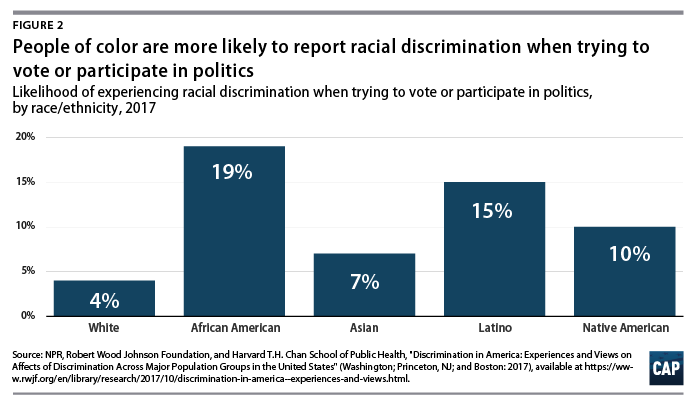The United States is the country for freedom and equality, however if you look deeper, that is not exactly the case. Racism is still continuing in today’s society without most people noticing. This is because it has been adapted into our society and seen as normal, therefore is being overlooked and swept under the rug. A prime example of systemic injustice going on in today’s society, especially lately, is within the nation’s political system. Every U.S. citizen should have the right to vote. However, in the past elections we see that a large portion of the African American community lacked voting rights. This causes issues in the election process because many of those can’t vote on people who they share values and ideas with.
These people are being denied voting rights because of new rules being implemented into the voting process. For example, in 2018 a law required citizens to provide an ID and a valid residential street address in order to vote. This law was indirectly aimed towards Native Americans, because they lived on reservations with no residential street address. In 2017, it was seen that people of other races are 4 times as likely than whites to experience racial discrimination throughout the voting process. Finally, in 2012, the national voter turnout for African Americans was higher than whites for the first time ever. This caused the U.S. Supreme Court to eliminate voting right protections and threaten to undo decades worth of equality voting progress. The nation’s political system has improved over the years with racial discrimination. For we have had an African American president elected. However, that doesn’t mean racial discrimination is not still going on behind the scenes. Examples of old discrimination tactics are still being used in politics to this day whether people notice or not since it has become a norm in society.
This systemic injustice example can be easily related to the concept of the “One” and the “Other” that we learned in this course. In this case, the government/political voting system would be considered the “One”, whereas the African American community would be considered the “Other”. The African Americans have little to no say in whether they are eligible for voting rights or not since the policies are changed by the government. It is all determined by our nation’s voting system. This can also be related to the “Letter from Birmingham Jail” that we read previously in this course. This reading is about the whole Civil Rights Movement and fighting for African Americans equal rights, which can easily be tied into this systemic injustice example seen in our nation to this day.
Resources:
Thanks for this post! This is a large issue that has recently been in the news with states like Georgia passing legislation to further restrict voting. I didn’t realize that address requirements were targeting Native Americans. Legislation like this is dangerous because it is discriminatory without it being obvious at first glance. Voting rights are extremely important for individuals to have a say in their government, the same government that is working on restricting rights to vote. Thank you for talking about this topic and providing the chart!